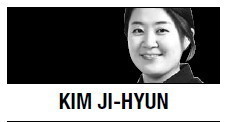 Celebrity chef Baek Jong-won is on fire. The man is currently one of the nation’s most sought-after cuisiniers, hosting several TV cook shows and running a chain of successful diners.
Celebrity chef Baek Jong-won is on fire. The man is currently one of the nation’s most sought-after cuisiniers, hosting several TV cook shows and running a chain of successful diners. The best thing about him is that he actually knows what he is talking about. His recipes are easy to follow and they really work.
However, while I agree that Baek is a hardworking man who deserved to become famous, I cannot help feeling that he also happened to be in the right place at the right time.
Baek came onto the scene at a time when Koreans were getting exceedingly tired of serious stuff, like the economy or politics. They were looking for more fun and entertainment in their lives.
And when you watch the chef whip up his signature do-it-yourself dishes, it’s easy to forget that the Korean economy is a sinking ship.
It’s not that all industries are a failure – the service and entertainment sectors are thriving -- but brick-and-mortar firms are definitely facing one of their biggest challenges ever.
Demand is low and competition is overflowing. It’s widely predicted that foreign capital will start flowing into Korea at a faster pace as the economy loses its edge.
These predictions are not new, of course, and together with the media, the country has fought overseas investors with a vengeance.
The takeover of Ssangyong Motors by China’s SAIC Motor, Lone Star’s takeover of Korea Exchange Bank and the latest attempt by Elliott to dismantle Samsung’s mergers and acquisitions plans are some examples.
More will come, and the Korean economy does not seem healthy enough to fight back. Attracting investment from investors overseas is one thing. Being completely taken over is another.
Some countries, such as Singapore and Hong Kong, are more open, but given Korea’s strong Confucian background and invasion-riddled history, it seems unlikely that it would welcome such takeovers.
So then, what is to be done?
We could take a cue from Japan, a country that has been undergoing some drastic reforms over the past several years to overcome an ongoing recession.
Most notable are the mergers and acquisitions of traditional Japanese firms. It is still rare to see whole firms team up, but strategic tie-ups between different units at different firms are now a norm. Toyota and Mazda or Yamada Denki and SoftBank are just two examples.
Similar corporate history must be made in Korea, but it has yet to happen.
Take, for example, POSCO.
It has been some months since the steelmaker was ransacked for corruption that was found to have taken place continuously and systematically on various levels. The company has put some reforms in motion. But whether it can completely change itself around and face the unshakable competition from China, only time will tell.
Some analysts say if POSCO does a half-baked job, it may find itself on the list of prospective buys for foreign investors looking for a firm to pick clean. POSCO is still relatively healthy, with sufficient expertise and global reach, making it quite a catch. Particularly for POSCO, the government must stop its meddling and play a minimal role in the firm’s recovery.
The change must come from within.
The steelmaker is not alone. Hyundai Motor, which is quickly losing some top overseas customers due to its ambiguous brand image, is another company that needs to face the music, and so does Hyundai Heavy Industries.
Construction firms, once the backbone of the Korean economy, also require radical restructuring to avoid becoming takeover targets.
Some experts say the Korean economy has about five years to go before it collapses altogether. This is based on a number of factors, including the deterioration of key industries and a dwindling population.
For investors, it could actually be a chance to swoop in and acquire companies and stocks at dirt-cheap prices.
But when you remember the horror of the Asian financial crisis that literally changed the lives of so many Koreans, I would rather we pick ourselves up when we can.
The cause may be different, but we are in similarly bad shape as we were about 20 years ago. Let’s get it back together before someone else does it for us.
By Kim Ji-hyun
The writer is The Korea Herald's Tokyo correspondent. She can be reached at jemmie@heraldcorp.com">jemmie@heraldcorp.com.-Ed.




![[Herald Interview] 'Amid aging population, Korea to invite more young professionals from overseas'](http://res.heraldm.com/phpwas/restmb_idxmake.php?idx=644&simg=/content/image/2024/04/24/20240424050844_0.jpg&u=20240424200058)












![[KH Explains] Korean shipbuilding stocks rally: Real growth or bubble?](http://res.heraldm.com/phpwas/restmb_idxmake.php?idx=652&simg=/content/image/2024/04/25/20240425050656_0.jpg&u=)

